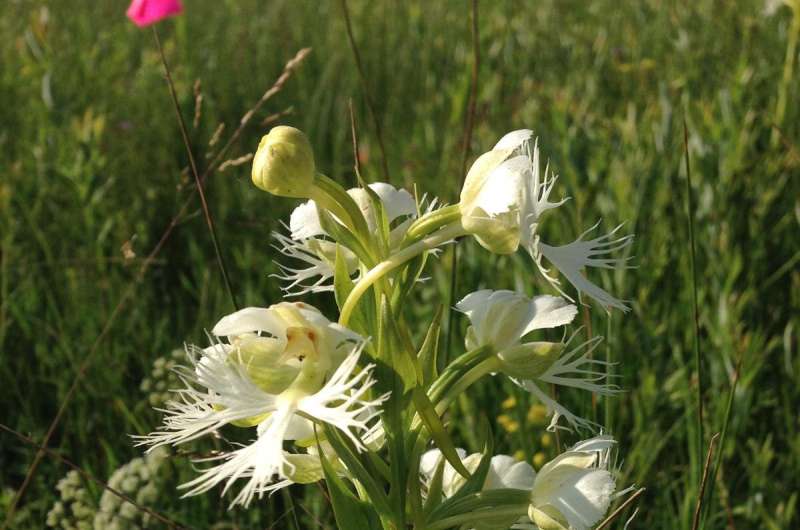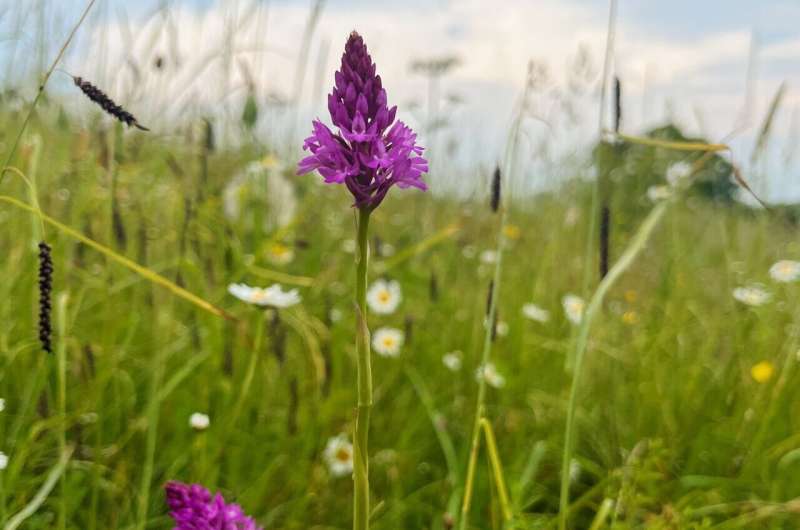This article has been reviewed according to Science X's editorial process and policies. Editors have highlighted the following attributes while ensuring the content's credibility:
fact-checked
peer-reviewed publication
trusted source
proofread
Global cooling caused diversity of species in orchids, confirms study

Research led by the Milner Center for Evolution at the University of Bath looking at the evolution of terrestrial orchid species has found that global cooling of the climate appears to be the major driving factor in their diversity. The results help scientists understand the role of global climate on diversity of species, and how our current changing global climate might affect biodiversity in the future.
One of the largest families of plants, there are about 28,000 species of orchids growing across the world. These plants are known for their huge variety of different sized and shaped flowers, but why are there so many species?
Climate change driving speciation
Charles Darwin studied orchids as a model for evolution through natural selection, proposing that they evolved an array of different flowers gradually over time to attract specific pollinators.
However, scientists at the Universities of Bath and York studying almost 1,500 species of terrestrial orchids, have found that rather than evolving gradually over thousands of years, these plants diversified relatively quickly due to changes in global temperature.
Analyzing thousands of DNA sequences, they compiled a family tree showing relationships between the species, and used statistical models to test how changes in climate during the Earth's history might have driven the formation of new species. They then tested the different possible models using more than 2.5 million records of geographical distributions. The results are published in the journal Proceedings of the National Academy of Sciences.
The team found evidence that most of the species appeared during the last 10 million years, coinciding with global cooling, as calculated from geological records. Modeling the probability of different drivers of speciation suggested that global cooling is 700 times more likely to influence speciation of orchids than time alone.

Everything, everywhere, all at once
Dr. Jamie Thompson, first author of the paper and researcher at the Milner Center for Evolution at the University of Bath, said, "Darwin proposed that orchids adapted gradually through natural selection to attract different pollinators, but our data show that it's more complicated than that.
"There was an explosion of diversity in terrestrial orchids across the globe within the last 10 million years, with all the major lineages of these plants emerging at roughly the same time.
"We found this correlated with global climate change, so that more species emerged as the climate cooled, giving the first evidence of global cooling driving speciation in these plants."
Speciation rate independent of diversity
The researchers also found that the speciation rate—how quickly new species arise—wasn't dependent on how many species there were to begin with.
Dr. Nick Priest, Lecturer at the Milner Center for Evolution and senior author of the study, said, "Our biogeographic analysis revealed consistent effects of climate change on speciation across the Earth. But we were surprised to find that the regions that have high diversity don't necessarily have high speciation rates.
"This has implications for conservation strategies—that we can't just count on preserving a few small pockets of land to protect evolutionary diversity—it's important to try and conserve everything we possibly can.
"What we want to investigate next in all flowering plants is whether there is a simple effect of temperature or if there is a threshold that needs to be passed before there is a surge in speciation.
"We also want to predict how rising temperatures due to global climate change will impact the processes generating plant biodiversity."
Dr. Katie Davis, Lecturer in Paleobiology at the University of York, said, "Our findings also show the importance of considering evolution over geological time scales. Understanding how organisms evolve in response to global environmental change has important implications for conservation and we can only know this by looking at the deep evolutionary history."
More information: Thompson, Jamie B. et al, Speciation across the Earth driven by global cooling in terrestrial orchids, Proceedings of the National Academy of Sciences (2023). DOI: 10.1073/pnas.2102408120
Journal information: Proceedings of the National Academy of Sciences
Provided by University of Bath





















